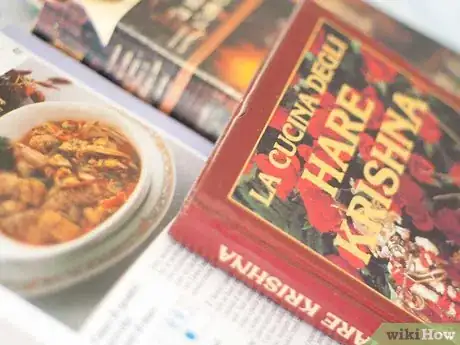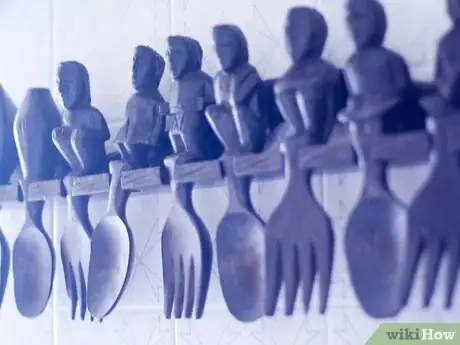X
wikiHow is a “wiki,” similar to Wikipedia, which means that many of our articles are co-written by multiple authors. To create this article, volunteer authors worked to edit and improve it over time.
This article has been viewed 53,484 times.
Learn more...
Food philosophies pop up under a lot of different guises and movements and many of them are good things to consider next time you have a meal. Here we will look at a variety of different philosophies as well as how you can make your own.
Steps
-
1Consider what a food philosophy is. Its mostly a cuisine influenced by certain ideals. There is a lot of different types as well as philosophies which incorporate a lot of ideals, so these may often include:
- Vegetarian or ethical influences.
- Medicinal or health focused balance of ingredients.
- Such as low fat, gluten free, low carbohydrate etc, some are also cultural, like imperial Chinese cuisine focused on the health needs of the patron etc, many international cuisines have a health cuisine. This can also be expanded to balance of spices and herbs with a health focus.
- Production influences.
- Such as organic, sustainability issues, low carbon, a seasonal cuisine or supporting local producers etc.
- Quality and freshness of food and ingredients.
- Communal food.
- This can be cooking and preparing as well as eating with family and friends, whether this expands to food communally produced or not, or getting involved in community cooking such as holding food stalls, cultural festivals, volunteer cooking for your local church or social group etc.
- Comfort food or "feel good" focus.
- "Knowing" food.
- This preference wishes to know about the food, where it comes from, who produces it down to the dynamics of production such as soil types, seasonal influences and harvest methods.
- DIY food.
- This mostly focuses more on cooking from scratch and making various things (such as breads, preserves etc) by hand.
- Nostalgia food.
- This can be an interest in older fashioned recipes and methods which are now rare, or recipes from your childhood.
- Slow food movement.
- The slow food movement celebrates many things such as more gentle cooking and a more relaxed dining method.
- Aesthetics of the food
- Such as how it is presented as well as what it is served on (dishware and cutlery etc), and considerations such as art (art nouveau cuisine is a good example), structure and garnish, a "wow factor" or colours etc.
- Elitist movement.
- This can be selecting certain types of meals due to class focuses (such as not eating the more older peasant style dishes, or everyday dishes eaten by the ordinary person), it can be expanded to buying foods endorsed by "experts".
- There are however many more.
-
2Consider what you personally feel in the foods you select. You may already be operating under a food philosophy of type, aside from your personal food tastes and preferences.Advertisement
-
3Consider the benefits and disadvantages of incorporating different philosophies.
- Some advantages are that it can expand your horizons in cooking and dining methods as well as gain an insight into different cultures. It can introduce you to new ideas and methods that could introduce more interest, fun and enjoyment into your cooking as well as meet new friends.
- The disadvantage is it can work exactly the opposite way, such as isolating you from people who do not have a food philosophy, or creating prejudice for those who don't have a philosophy.
-
4Try to incorporate aspects which have the most long term benefit to you and your family. It might be to reduce meat for ethical or health reasons, it might be to occasionally visit a farming town to learn how food is produced as well as try some locally made food. It might be to encourage a sense of community by inviting your neighbours around for a meal or expand your knowledge of other cultures etc.
-
5Try to consider ways to avoid how a philosophy could be a disadvantage as well as how you can avoid these disadvantages.
- A common trap is a case where a person buys "the best" simply because it is said to be the best, without actually knowing why it is good or what makes the other inferior. There can be quite a degree of ignorance and influence easily by celebrity chefs so this person might easily be taken advantage of (as they might not know the difference), or pay more for something they could easily make themselves, or pay more for a same quality product just because of the endorsement, or miss out on many good cuisines that are not "endorsed"
- Another trap is a person who focuses too much of one just type of cuisine - such as solely comfort food may compromise their health, or live in a very small range of dishes and repertoire.
-
6Look into social groups that may be of a similar philosophy. Many of these operate social groups be they trips to producers, or a nice place in the country to visit for a meal, or cooking classes etc.
Advertisement
Community Q&A
-
QuestionWhat is the philosophy of the best chef?
 Otterly BadgerificTop AnswererThere is no such thing as a single best chef ever, but there are many chefs who are considered by diners and food critics to be the best in their cuisine at any particular time in cooking history. They would likely have a philosophy that involves using high quality ingredients, local and seasonal food, avoidance of fads and restrictive diets, appreciating the pleasures and love of food, and not being swayed by people who have a tendency to police or limit the joy of food. To find the food philosophies that best ring true for you, do some reading up on famous, celebrated chefs in the cuisine areas that are of most interest to you, and not just from current times but also from the past.
Otterly BadgerificTop AnswererThere is no such thing as a single best chef ever, but there are many chefs who are considered by diners and food critics to be the best in their cuisine at any particular time in cooking history. They would likely have a philosophy that involves using high quality ingredients, local and seasonal food, avoidance of fads and restrictive diets, appreciating the pleasures and love of food, and not being swayed by people who have a tendency to police or limit the joy of food. To find the food philosophies that best ring true for you, do some reading up on famous, celebrated chefs in the cuisine areas that are of most interest to you, and not just from current times but also from the past.
Advertisement
About This Article
Advertisement



























































